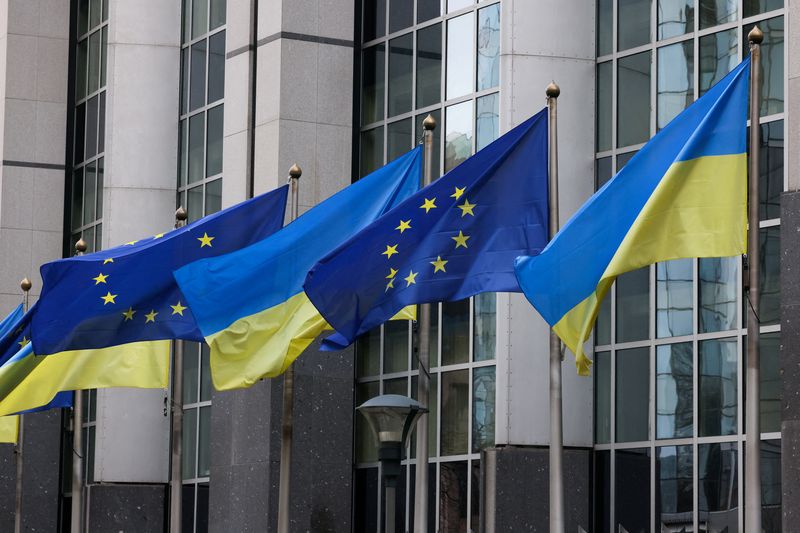EU envoys agree to use profits from frozen Russian assets for Ukraine
2024.05.08 14:42

By Julia Payne
BRUSSELS (Reuters) – Ambassadors from European Union countries agreed on Wednesday to use windfall profits from Russian central bank assets frozen in the EU for Ukraine’s defence, the Belgian government said.
Ministers still need to approve the legal text that will see 90% of the proceeds go into an EU-run fund for military aid for Ukraine, with the other 10% going to support Kyiv in other ways, four EU diplomatic sources said.
The Group of Seven countries (G7) froze around $300 billion worth of Russian financial assets soon after Moscow’s invasion of Ukraine in 2022. Since then, the EU and other G7 countries have debated how and whether to use the funds to help Ukraine.
“The money will serve to support … Ukraine’s recovery and military defence in the context of the Russian aggression,” Belgium, which holds the EU presidency until the end of June, said in a post on X.
The United States has proposed seizing the assets in their entirety, but Europe has balked, citing risks to the euro and massive legal repercussions. More recently, Washington has pushed for using the assets as collateral to provide loans for Ukraine.
In late April, Russian officials threatened the West with a “severe” response and “endless” legal challenges if the assets are touched.
“There could be no stronger symbol and no greater use for that money than to make Ukraine and all of Europe a safer place to live,” European Commission President Ursula von der Leyen posted on X.
As part of the deal, EU countries that do not give arms to Ukraine – such as neutral Austria – will abstain from the vote to allocate 90% of the funds to military aid, diplomats said.
“We are glad that Austria’s concerns were heard and we have reached a political agreement allowing us to constructively abstain,” the Austrian foreign ministry said in a statement.
“Austria, as a militarily neutral country, cannot and will not fund or supply lethal material to Ukraine.”
EUROCLEAR
The EU has estimated that windfall profits from the assets held in the bloc will total between 15 billion and 20 billion euros ($37.6 billion) by 2027.
That includes around 3 billion euros ($3.2 billion) this year, the first $1 billion of which could be disbursed as soon as July, von der Leyen previously said.
The assets have been gaining exceptional interest because they are stuck, resulting in these so-called windfall profits.
Belgium’s securities settlement house Euroclear handles the bulk of the assets immobilised in the EU.
Three sources, who spoke on condition of anonymity, said Euroclear’s management fee would be reduced to 0.3% from 3% to free up more cash for Ukraine.
A spokesperson for Euroclear declined to comment.
At the end of the first quarter of 2024, Euroclear Bank’s balance sheet totalled 199 billion euros, of which 159 billion euros related to the Russian assets, it said in its first-quarter results.
Belgium is separately collecting tax on the profits from Euroclear which is set aside for Ukraine.
For the fiscal year 2024, Belgium expects to receive 1.7 billion euros, with the bulk already allocated for Ukraine’s military.
Euroclear said it made 1.6 billion euros in interest from the assets in the first quarter, of which nearly 400 million euros was tax for Belgium.
($1 = 0.9305 euro)








